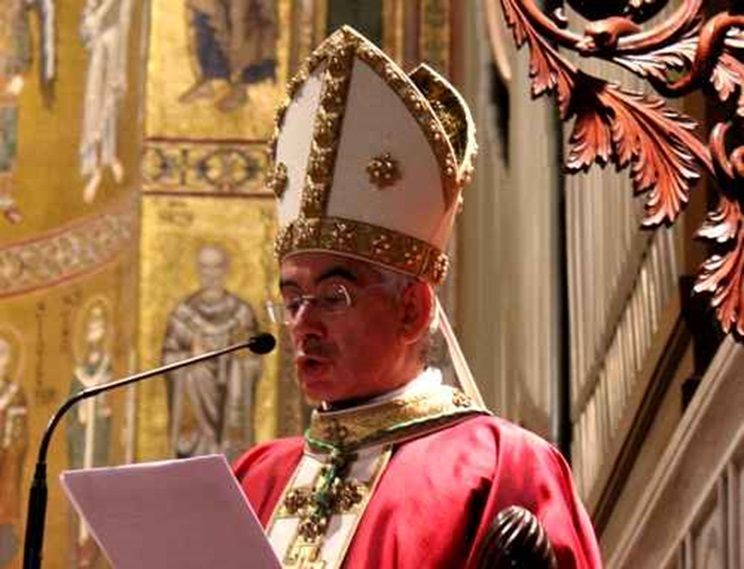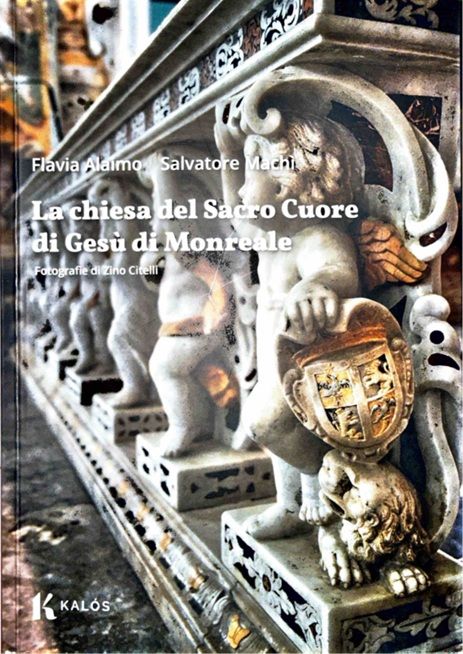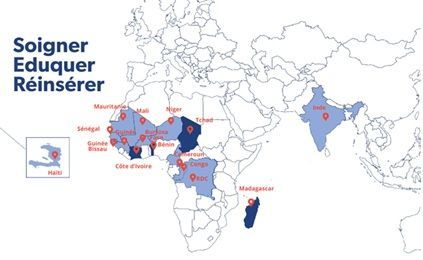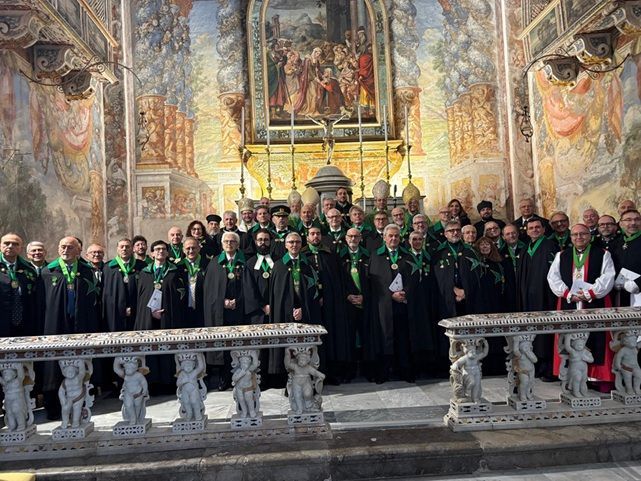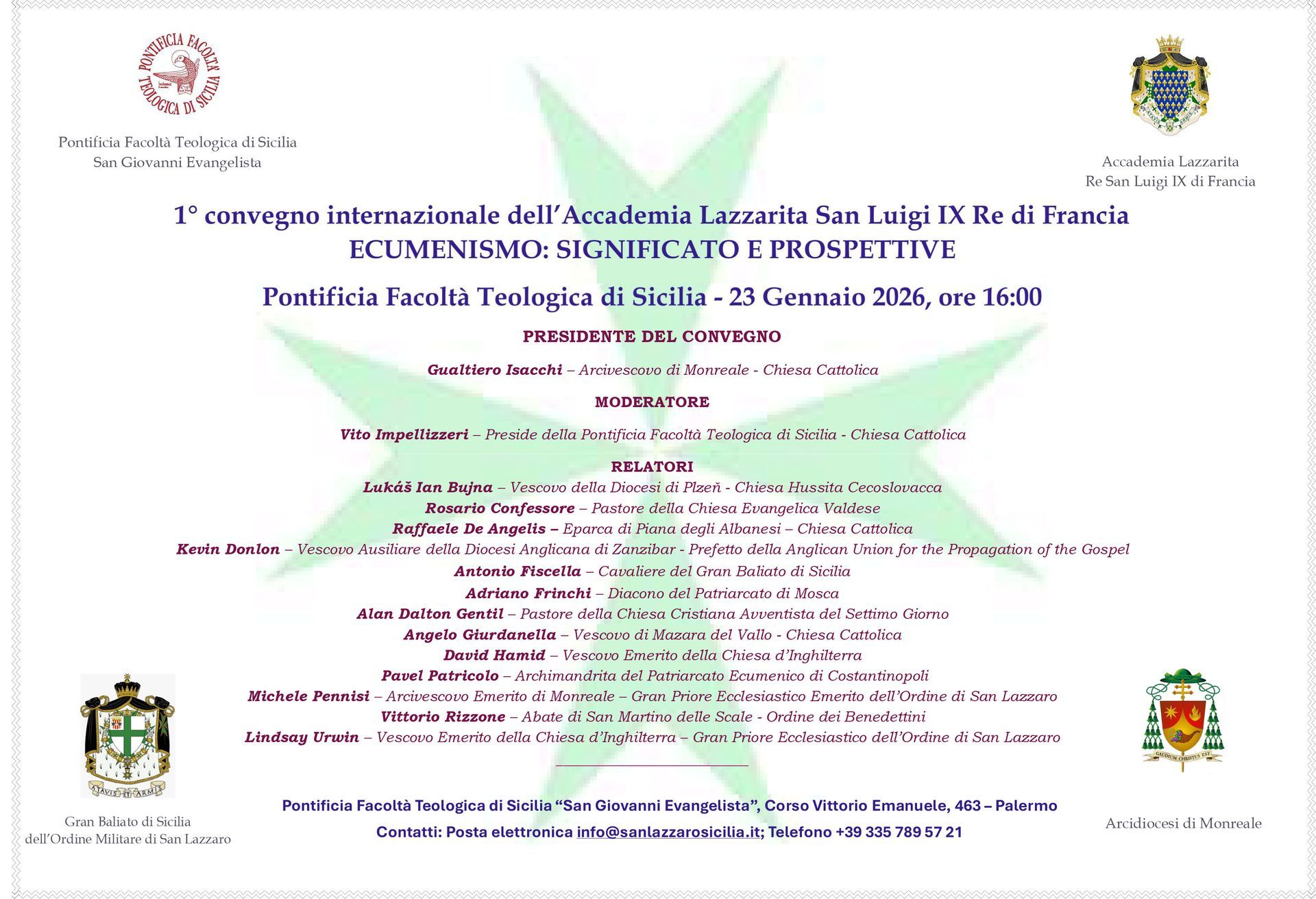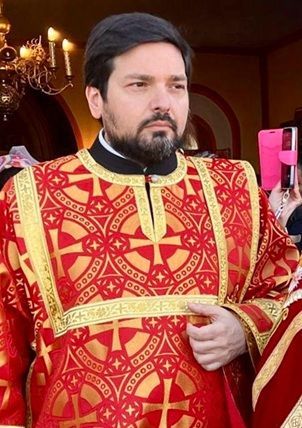MESSAGGIO DEL GRAN PRIORE ECCLESIASTICO DELL’ORDINE DI SAN LAZZARO DI GERUSALEMME PER LA SETTIMANA DI PREGHIERA PER L’UNITA’ DEI CRISTIANI
MESSAGGIO DEL GRAN PRIORE ECCLESIASTICO DELL’ORDINE DI SAN LAZZARO DI GERUSALEMME PER LA SETTIMANA DI PREGHIERA PER L’UNITA’ DEI CRISTIANI
Carissimi Confratelli e Consorelle dell’Ordine Militare di San Lazzaro di Gerusalemme,
Il tema della Settimana di preghiera per l’unità dei cristiani 2024, suggerito dai cristiani del Burkina Faso, è “Ama il Signore Dio tuo... e ama il prossimo tuo come te stesso” (Lc 10, 27). Noi troviamo la nostra comune identità nell’esperienza dell’amore di Dio (cfr. Gv 3, 16) e manifestiamo questa identità al mondo nella misura in cui ci amiamo gli uni gli altri (cfr. Gv 13, 35).
La parabola del Buon Samaritano, dalla quale è ripreso il tema di quest’anno, è un racconto generativo di umanità, perché contiene il volto di Dio e la soluzione possibile dell'intero dramma dell'uomo. Il verbo centrale della parabola, è espresso con le parole "ne ebbe compassione. La compassione è sottrarre il dolore alla sua solitudine, soffrire con l’altro per dare un senso al dolore delle persone senza differenze di razza e di religione. Coi suoi gesti il buon samaritano ha mostrato che l’esistenza di ciascuno di noi è legata a quella degli altri. La forza che spinge a soccorrere chi è nel bisogno non deve risiedere nel fatto di condividere la medesima identità, ma nel fatto di considerarlo “prossimo”.
Gesù ha pregato che i suoi discepoli fossero tutti una cosa sola (cfr. Gv 17, 21): per questo motivo noi cristiani non possiamo smettere di pregare e operare per l’unità. Siamo uniti, in Cristo, dal nostro comune amore per Dio e dalla consapevolezza di essere amati da Dio. Quando preghiamo, adoriamo e serviamo Dio insieme, ci riconosciamo reciprocamente nella medesima esperienza di fede.
In quelli che passano a distanza c’è un particolare che non possiamo ignorare: erano persone religiose: un sacerdote e un levita. Il fatto di credere in Dio e di adorarlo non garantisce di vivere come a Dio piace. Come il sacerdote e il levita nel brano evangelico, i cristiani spesso non cogliamo l’opportunità di entrare in relazione con i nostri fratelli e le loro sorelle.
La parabola del Buon Samaritano nell'interpretazione di molti Padri della Chiesa è l'autoritratto di Gesù, che, mosso a compassione, venne in aiuto dell’uomo agonizzante, ne curò le ferite e lo portò al sicuro in una locanda, che è vista come l’immagine della Chiesa chiamata ad amare come Cristo, mostrando misericordia e compassione verso chi è nel bisogno, a prescindere dalla sua identità religiosa, etnica o sociale. Il Signore affida coloro che nel mondo sono feriti e bisognosi alle nostre chiese, per curare le loro ferite e contribuire alla loro guarigione. Questa missione al servizio del mondo è anche la via verso quell’unità che è dono di Dio al suo popolo.
È Cristo che ci spinge ad evitare le inutili dispute accademiche, i falsi moralismi, gli ipocriti formalismi, le divisioni storiche e a non passare oltre magari con la scusa di salvaguardare la nostra onestà e di adempiere i nostri doveri religiosi, ma a farci prossimi dell'uomo di oggi depredato, trascurato, dimenticato, piagato nel corpo e nello spirito e a condividere le sue sofferenze e rispondere ai suoi bisogni, senza guardare se fa parte della propria cerchia di appartenenza,
Non dobbiamo dire più che abbiamo dei “prossimi” da aiutare, ma che ognuno di noi siamo chiamati a diventare un prossimo degli altri.
Nella missione del nostro Ordine c’è quella di essere dei Buoni Samaritani nei confronti dei malati di lebbra, per i quali il 28 gennaio 2024 si celebra la 71esima Giornata Mondiale. La lebbra purtroppo esiste ancora e colpisce ancora molte persone in diversi paesi. È causata da fattori concomitanti: povertà, mancanza di igiene e alimentazione adeguata, oltre a sistemi sanitari locali molto deboli. Aiutiamo i malati che spesso non hanno possibilità di reinserimento sociale a curarsi dignitosamente.
Durante questa Settimana di preghiera per l’unità dei cristiani, chiediamo al Signore di venire in nostro aiuto, di curare le nostre ferite per essere prossimo di chi soffre e permetterci, così, di percorrere la via dell’ecumenismo della carità con fiducia e speranza.
Monreale, 14 gennaio 2024
+ Michele Pennisi
Arcivescovo Emerito di Monreale
Gran Priore Ecclesiastico dell’Ordine di San Lazzaro di Gerusalemme
MESSAGE FROM THE ECCLESIASTICAL GRAND PRIOR OF THE ORDER OF SAINT LAZARUS OF JERUSALEM FOR THE WEEK OF PRAYER FOR CHRISTIAN UNITY
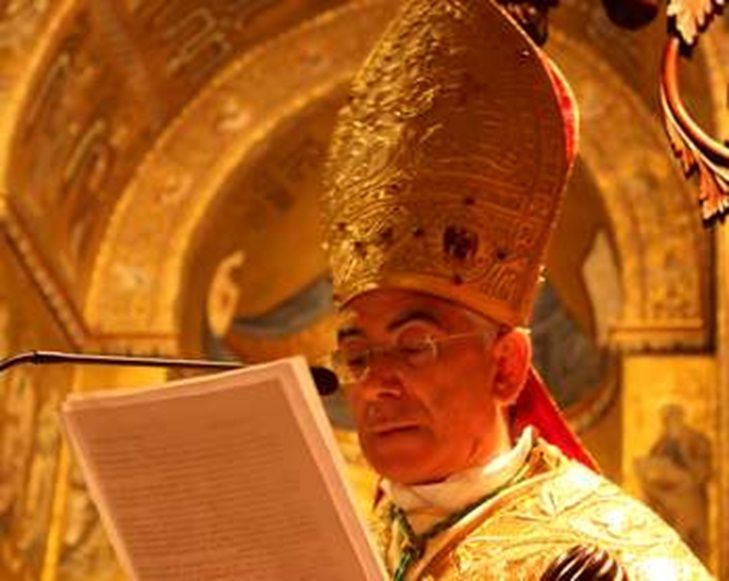
Dear Brothers and Sisters of the Military Order of St Lazarus of Jerusalem,
The theme of the Week of Prayer for Christian Unity 2024, suggested by the Christians of Burkina Faso, is "Love the Lord your God... and love your neighbour as yourself" (Lk 10:27). We find our common identity in the experience of God's love (cf. Jn 3:16) and we manifest this identity to the world to the extent that we love one another (cf. Jn 13:35).
The parable of the Good Samaritan, from which this year's theme is taken, is the overarching story of humanity, because it contains the face of God and the possible solution of the entire human drama. The central verb of the parable is expressed in the words "He had compassion on him”. Compassion is taking pain away from its loneliness, suffering with the other in order to make sense of the pain of people without differences of race or religion. By his gestures, the Good Samaritan showed that the existence of each of us is linked to that of others. The strength that impels us to help those in need must not lie in the fact that we share the same identity, but in the fact that we consider them "neighbours".
Jesus prayed that his disciples would all be one (cf. Jn 17:21): for this reason, we Christians cannot cease to pray and work for unity. We are united in Christ by our common love for God and the awareness that we are loved by God. When we pray, worship and serve God together, we recognise each other in the same experience of faith.
There is one detail about those who passed by at a distance that we cannot ignore: they were religious people - a priest and a Levite. Believing in and worshipping God does not guarantee that you will live as God pleases. Like the priest and the Levite in the Gospel passage, Christians often miss the opportunity to enter into a relationship with their brothers and sisters.
The parable of the Good Samaritan in the interpretation of many Fathers of the Church is the self-portrait of Jesus, who, moved by compassion, came to the aid of the injured man, healed his wounds and carried him to safety in an inn. It is also seen as the image of the Church called to love like Christ, showing mercy and compassion towards those in need, regardless of their religious, ethnic or social identity. The Lord entrusts those in the world who are wounded and needy to our churches, to heal their wounds and contribute to their healing. This mission at the service of the world is also the way to that unity which is God's gift to his people.
It is Christ who urges us to avoid useless academic disputes, false moralisms, hypocritical formalisms and historical divisions and not to pass by, perhaps with the excuse of safeguarding our honesty and fulfilling our religious duties, but to be close to the people of today, plundered, neglected, forgotten, wounded in body and spirit, and to share their sufferings and respond to their needs without looking at whether they are part of our own circle.
We must no longer say that we have "neighbours" to help, but that each of us is called to become a neighbour of others.
Our Order's mission is to be Good Samaritans towards leprosy patients, for whom the 71st World Leprosy Day is celebrated on 28 January 2024. Leprosy, unfortunately, still exists and still affects many people in different countries. It is caused by concomitant factors: poverty, lack of hygiene and adequate nutrition, as well as very weak local health systems. We help sick people who often have no chance of reintegration into society to receive dignified treatment.
During this Week of Prayer for Christian Unity, let us ask the Lord to come to our aid, to heal our wounds in order to be close to those who suffer and thus enable us to walk the path of ecumenism of charity with trust and hope.
Monreale, 14 January 2024
+ Michele Pennisi
Archbishop Emeritus of Monreale
Ecclesiastical Grand Prior of the Order of St Lazarus of Jerusalem

